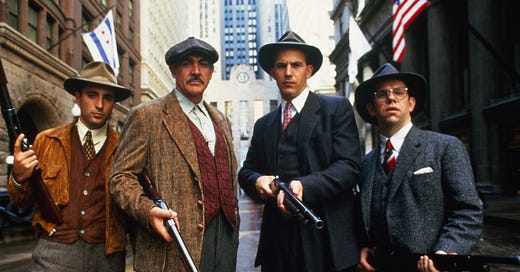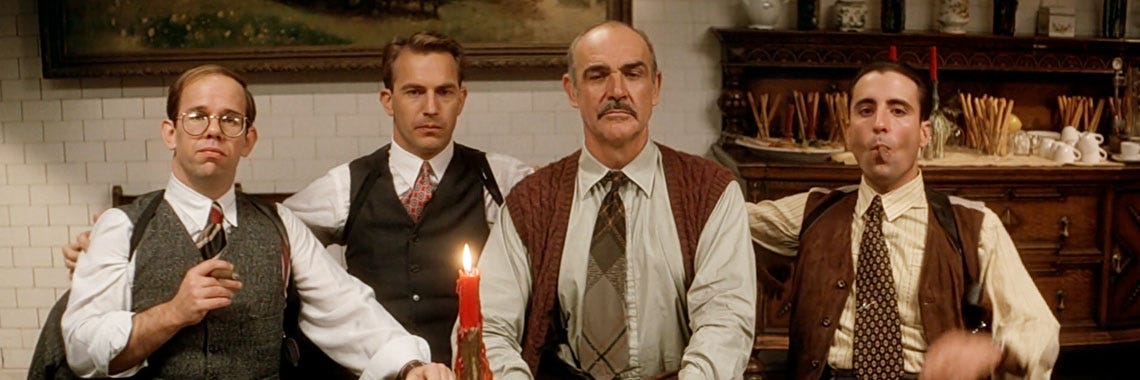Note: If you want to have the optimal reading experience for this review, before you read below, please load up this YouTube music in another tab, and then return to this review.
Can you recall the ten edgiest guys from your high school? Imagine you gave them millions of dollars, a script by Mamet, an acre of cocaine, and told them: Make a movie about Twenties Chicago. "The Untouchables" is what they would come up with. Do not be fooled by its polished veneer of historical respectability, its gorgeous cinematography: this film is a madman's fever dream. It is existentially deranged--in narrative, characterization, and theme. At its core, "The Untouchables" is a bad movie laboring under the delusion that it is a great movie, and this makes it compulsively watchable. It is gloriously stupid, an improv skit held together by style, vibes, hats, and guns.
The only film it is comparable to is "The Devil's Advocate," but that movie did not have a gunfight in a train station with a baby. The horrified understanding shared by the Canadian mounties in the bridge scene is our reaction too: Good God, what am I watching? There's an accountant who turns into John Wick.
Oh, what's that? You'd like a realistic treatment of the detective work that took Capone down? How about no. How about instead we give you twelve-year old Andy Garcia blowing a guy's freaking head off, how's that for history? You want subtlety? How about you go to hell. DePalma tells you what to expect during the "Taking the newspaper to Capone" scene at the Lexington.
We pass through door after door, and as we reach the swank bed room, the sassy trombone blares WAAAHH WAH WAH WAHHHH, and DeNiro's absolutely *wallowing* there in silk-pajama operatic crapulence--he's clearly just a degenerate garbage monster, and if you added a neon sign flashing "CRIME PAYS" above his head it would be thematically coherent. "What if Babe Ruth, but on angel dust" is the idea.
The true hero of this movie is what future psychologists will call "the Chicago psychosis." The Second City depicted here is less as a town and more a stage where lunatics like Capone and Ness perform for each other. Here, a man can live out his American dream of being a Scotsman pretending to be an Irish cop who is prejudiced against Italians. Why not.
Like "Face/Off," this film is essentially about how men are obsessed with other men: Does this guy respect me? Why not? What if I really cut loose, bro? The plot of the movie is basically guys daring each other to turn into the freaking Joker until you've got Ness lobbing dudes off roofs while screaming "DID HE SOUND ANYTHING LIKE THAT?"
Everyone plays themselves. Ness is Kevin Costner, playing Kevin Costner. I can't call what he's doing "acting," more like a 2x4 had the word "emote" written on it in Sharpie. Ness is our theoretical protagonist ... but the effect is of an empty, confused cardboard box given awareness and attempting clumsy beige goodness, before finally submitting to all his murderous impulses.
Like in our world, the Chicago Police Department is irredeemably evil and staffed by crooks, so Costner flails helplessly until he goes outside the law. He welds together a gang of gun-happy sociopaths. Connery, heroically depicting Sean Connery without a toupee, spends the film growling in motivational murder riddles: "You put one of theirsh in the morgue!" before being shot a million times in an hour-long death scene, and his mystical Yoda-like last words amount to "Kill the bastards." It's a goddamn circus act.
This film wants to be about justice, but it's more about a child's idea of justice. You can get an idea of how thoughtful it is in the last line--that's where Costner, who is responsible for his friends dying and who's killed half of Chicago, just to rip apart a bootlegging empire, jokes to a journalist that he might just go get a drink, and smirks like an absolute maniac.
I love every moment of it.







It's always fun to read your essays, even if I don't always understand. Sigh!